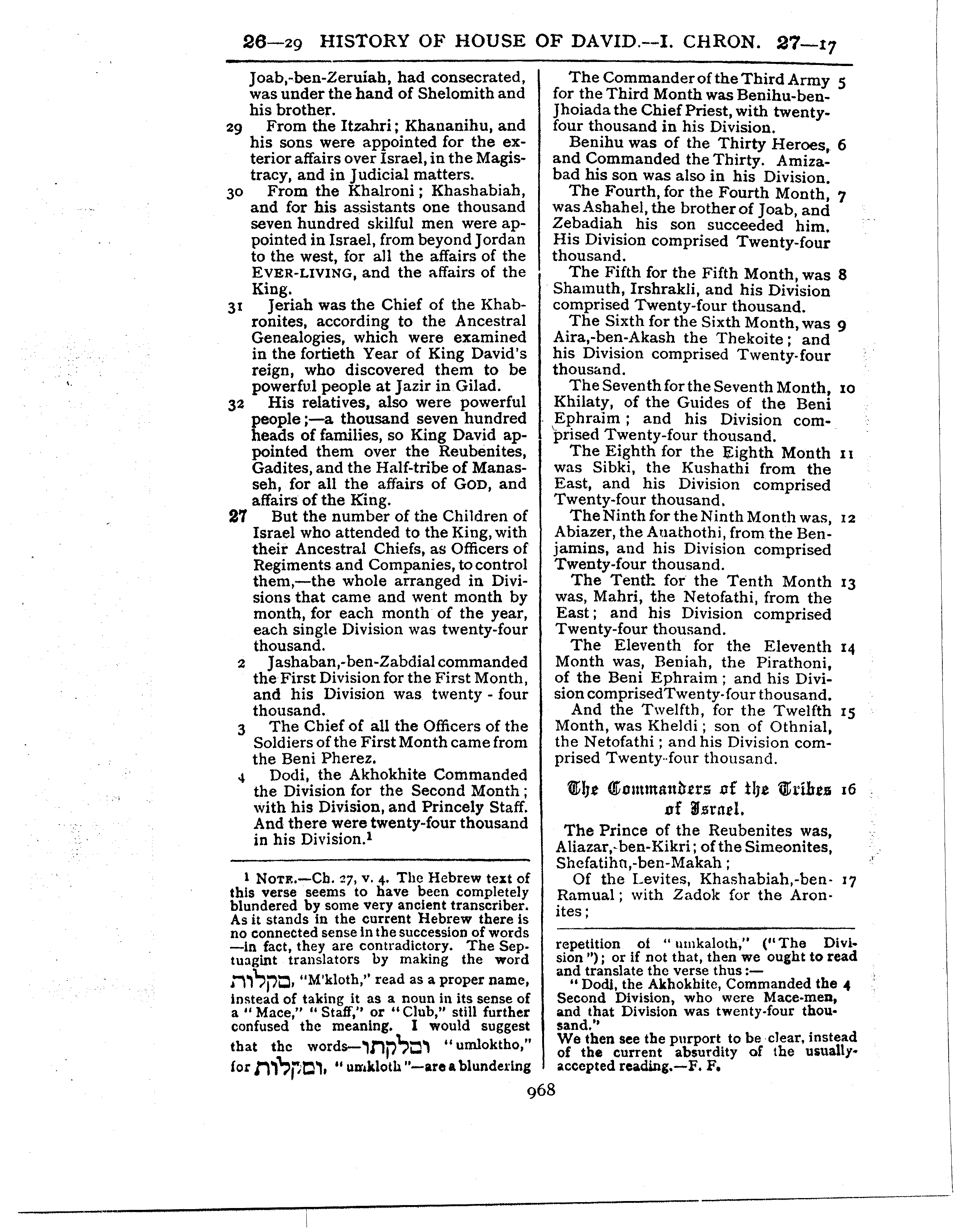First Book of Chronicles - Ferrar Fenton Bible Translation page 968
The Psalms, Solomon and Sacred Writers
his sons were appointed for the ex— terior affairs over Israe1,i¤ the Magis- tracy, and in judicial matters. From the Khalroni; Khashabiah,
and for his assistants one thousand seven hundred skilful men were ap- pointed in Israel, from beyond jordan to the west, for all the affairs of the Even-Lxvxwc, and the affairs of the King. jeriah was the Chief of the Khab—
ronites, according to the Ancestral Genealogies, which were examined in the fortieth Year of King David's reign, who discovered them to be powerful people at jazir in Gilad. His relatives, also were powerful
people ;-···a. thousand seven hundred heads of families, so King David ap- pointed them over the Reubenites, Gadites, and the Half-tribe of Manas- seh, for all the affairs of GOD, and affairs of the King. 27 But the number of the Children of Israel who attended to the King, with their Ancestral Chiefs, as Ofiicers of Regiments and Companies, to control them,——the whole arranged in Divi- sions that came and went month by month, for each month of the year, each single Division was twenty—four thousand. ]ashaban,—ben—Zabdial commanded
the·First Division for the First Month, and his Division was twenty · four thousand. The Chief of all the Ofiicers ofthe
Soldiers of the First Month came from the Beni Pherez. Dodi, the Akhokhite Commanded
the Division for the Second Month; with his Division, and Princely Staff. And there were twenty~four thousand in his Division. I No*rr:.——Cb. 27, v. 4. The Hebrew text of
this verse seems to have been completely blundered by some very ancient transcriber. As it stands in the current Hebrew there is no connected sense inthe succession of words in fact, they are contradictory. The Sep-
tungint translators by making the word read as a proper name, instead of taking it as a noun in its sense of still further confused the meaning. I would suggest -are ablundering The Commander of the Third Army
for the Third Month was Benihu—ben— jhoiada the Chief Priest, with twenty- four thousand in his Division. Benihu was of the Thirty Heroes,
and Commanded the Thirty. Amiza- bad his son was also in his Division. The Fourth, for the Fourth Month,
was Ashahel, the brother of joab, and Zebadiah his son succeeded him. His Division comprised T wenty—f0u1· thousand. The Fifth for the Fifth Month, was
Shamuth, Irshrakli, and his Division comprised Twenty·four thousand. The Sixth for the Sixth Month, was
Aira,-ben-Akash the Thekoite; and his Division comprised Twenty-four thousand. The Seventh for the Seventh Month,
Khilaty, of the Guides of the Beni Ephraim ; and his Division com- prised Twenty-four thousand. The Eighth for the Eighth Month
was Sibki, the Kushathi from the East, and his Division comprised Twenty-four thousand. The Ninth for the Ninth Month was,
Abiazer, the Auathothi, from the Ben- jamins, and his Division comprised Twenty·four thousand. The Tenth for the Tenth Month
was, Mahri, the Netofathi, from the East; and his Division comprised Twenty-four thousand. The Eleventh for the Eleventh
Month was, Beniah, the Pirathoni, of the Beni Ephraim; and his Divi- sion c:omprisedTwenty-four thousand. And the Twelfth, for the Twelfth
Month, was Kheldi; son of Othnial, the Netofathi ; and his Division com- prised '1`wenty··four thousand. W32 (limnttttatthzrs nf the ®rihrs nf Slsrael. The Prince of the Reubenites was,
Aliazar,—ben·Kikri; of the Simeonites, Shefatihu,—ben-Makah ; Of the Levites, Khashabiahpben-
Ramual; with Zadolt for the Aron- ites; IO II I2 16
The Divi- ); or if not that, then we ought to read and translate the verse thus :— ‘ Dodi, the Akhokhite, Commanded the 4 Second Division, who were Mace-men, and that Division was twc¤ty·f0ux: th0u· We than see the purport to be clear, instead of the current absurdity of the usually accepted reading.-F. F. 968
